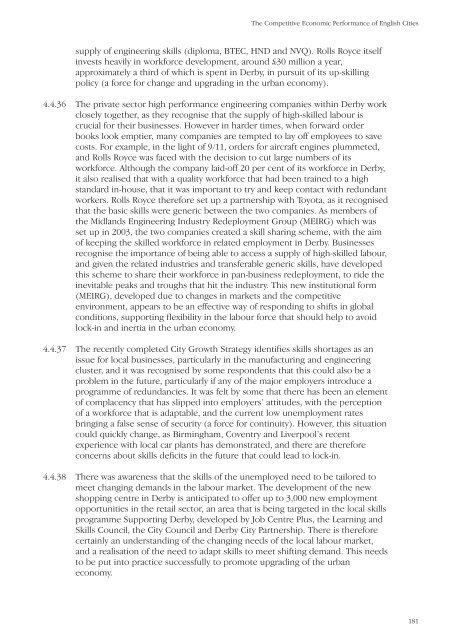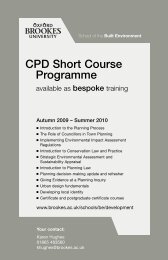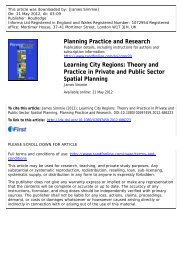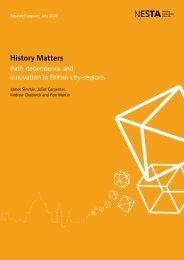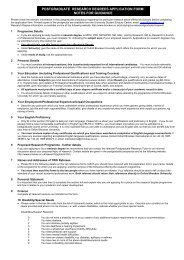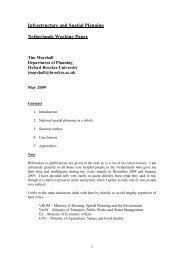The Competitive Economic Performance of English Cities
The Competitive Economic Performance of English Cities
The Competitive Economic Performance of English Cities
- No tags were found...
You also want an ePaper? Increase the reach of your titles
YUMPU automatically turns print PDFs into web optimized ePapers that Google loves.
<strong>The</strong> <strong>Competitive</strong> <strong>Economic</strong> <strong>Performance</strong> <strong>of</strong> <strong>English</strong> <strong>Cities</strong>supply <strong>of</strong> engineering skills (diploma, BTEC, HND and NVQ). Rolls Royce itselfinvests heavily in workforce development, around £30 million a year,approximately a third <strong>of</strong> which is spent in Derby, in pursuit <strong>of</strong> its up-skillingpolicy (a force for change and upgrading in the urban economy).4.4.36 <strong>The</strong> private sector high performance engineering companies within Derby workclosely together, as they recognise that the supply <strong>of</strong> high-skilled labour iscrucial for their businesses. However in harder times, when forward orderbooks look emptier, many companies are tempted to lay <strong>of</strong>f employees to savecosts. For example, in the light <strong>of</strong> 9/11, orders for aircraft engines plummeted,and Rolls Royce was faced with the decision to cut large numbers <strong>of</strong> itsworkforce. Although the company laid-<strong>of</strong>f 20 per cent <strong>of</strong> its workforce in Derby,it also realised that with a quality workforce that had been trained to a highstandard in-house, that it was important to try and keep contact with redundantworkers. Rolls Royce therefore set up a partnership with Toyota, as it recognisedthat the basic skills were generic between the two companies. As members <strong>of</strong>the Midlands Engineering Industry Redeployment Group (MEIRG) which wasset up in 2003, the two companies created a skill sharing scheme, with the aim<strong>of</strong> keeping the skilled workforce in related employment in Derby. Businessesrecognise the importance <strong>of</strong> being able to access a supply <strong>of</strong> high-skilled labour,and given the related industries and transferable generic skills, have developedthis scheme to share their workforce in pan-business redeployment, to ride theinevitable peaks and troughs that hit the industry. This new institutional form(MEIRG), developed due to changes in markets and the competitiveenvironment, appears to be an effective way <strong>of</strong> responding to shifts in globalconditions, supporting flexibility in the labour force that should help to avoidlock-in and inertia in the urban economy.4.4.37 <strong>The</strong> recently completed City Growth Strategy identifies skills shortages as anissue for local businesses, particularly in the manufacturing and engineeringcluster, and it was recognised by some respondents that this could also be aproblem in the future, particularly if any <strong>of</strong> the major employers introduce aprogramme <strong>of</strong> redundancies. It was felt by some that there has been an element<strong>of</strong> complacency that has slipped into employers’ attitudes, with the perception<strong>of</strong> a workforce that is adaptable, and the current low unemployment ratesbringing a false sense <strong>of</strong> security (a force for continuity). However, this situationcould quickly change, as Birmingham, Coventry and Liverpool’s recentexperience with local car plants has demonstrated, and there are thereforeconcerns about skills deficits in the future that could lead to lock-in.4.4.38 <strong>The</strong>re was awareness that the skills <strong>of</strong> the unemployed need to be tailored tomeet changing demands in the labour market. <strong>The</strong> development <strong>of</strong> the newshopping centre in Derby is anticipated to <strong>of</strong>fer up to 3,000 new employmentopportunities in the retail sector, an area that is being targeted in the local skillsprogramme Supporting Derby, developed by Job Centre Plus, the Learning andSkills Council, the City Council and Derby City Partnership. <strong>The</strong>re is thereforecertainly an understanding <strong>of</strong> the changing needs <strong>of</strong> the local labour market,and a realisation <strong>of</strong> the need to adapt skills to meet shifting demand. This needsto be put into practice successfully to promote upgrading <strong>of</strong> the urbaneconomy.181


